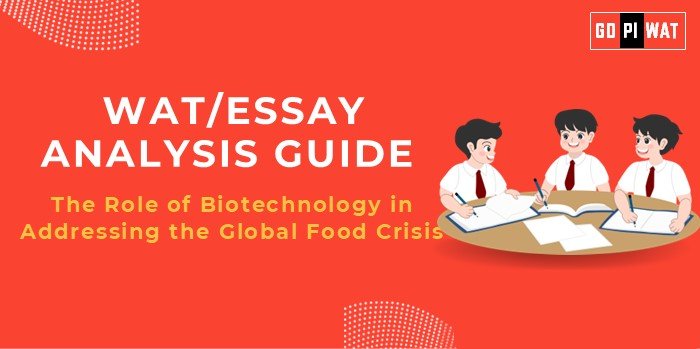📋 Written Ability Test (WAT)/Essay Analysis Guide: The Role of Biotechnology in Addressing the Global Food Crisis
🌐 Understanding Biotechnology’s Importance
The global food crisis intersects with economic, social, and environmental challenges. Biotechnology is pivotal in addressing these, enhancing agricultural productivity, and ensuring sustainable food systems.
📝 Effective Planning and Writing
- ⏳ Time Allocation (30 minutes):
- Planning: 5 minutes
- Writing: 20 minutes
- Review: 5 minutes
- 📖 Structure:
- Introduction: 60 words
- Body Paragraphs: 350 words
- Conclusion: 70 words
✨ Introduction Techniques for Essays
- Contrast Approach:
- Solution-Based Approach:
“While the Green Revolution marked a historic leap in food production, today’s crisis demands a more sophisticated tool—biotechnology.”
“The answer to feeding a growing global population lies in harnessing biotechnology for sustainable agriculture.”
📚 Structuring the Essay Body
Paragraph 1 – Achievements: Detail biotech successes, including GM crops, drought-resistant seeds, and pest management.
Paragraph 2 – Challenges with Comparative Analysis: Discuss regulatory, ethical, and accessibility issues using international examples.
Paragraph 3 – Future Outlook: Highlight advancements like CRISPR and biofortification, emphasizing global collaboration.
🏁 Concluding Effectively
- Balanced Perspective: “Biotechnology bridges the gap between traditional agriculture and modern food demands but requires inclusive and ethical policies.”
- Global Comparison Approach: “While countries like the US lead in biotech adoption, inclusive frameworks could help nations like India and Zimbabwe harness its potential.”
💡 Recommendations for Sustainable Progress
- 📜 Simplify GMO approval processes.
- 🔬 Invest in research for low-cost biotechnologies.
- 🌍 Promote public awareness about biotech’s benefits.
✍️ Sample Short Essays on Biotechnology
- Balanced Perspective:
- Solution-Oriented Approach:
- Global Comparison:
“Biotechnology holds immense potential to address global food shortages by enhancing yields and reducing environmental impact. However, ethical concerns and unequal access remain challenges to its widespread adoption. Balancing innovation with inclusivity is key to its success.”
“Biotechnology is the cornerstone of sustainable agriculture. To maximize its benefits, governments and corporations must collaborate on reducing costs, ensuring ethical practices, and enabling global food security.”
“Biotechnology’s success in nations like the US and Brazil contrasts with the resistance in regions like Africa, underscoring the need for tailored approaches to address cultural and regulatory barriers.”


